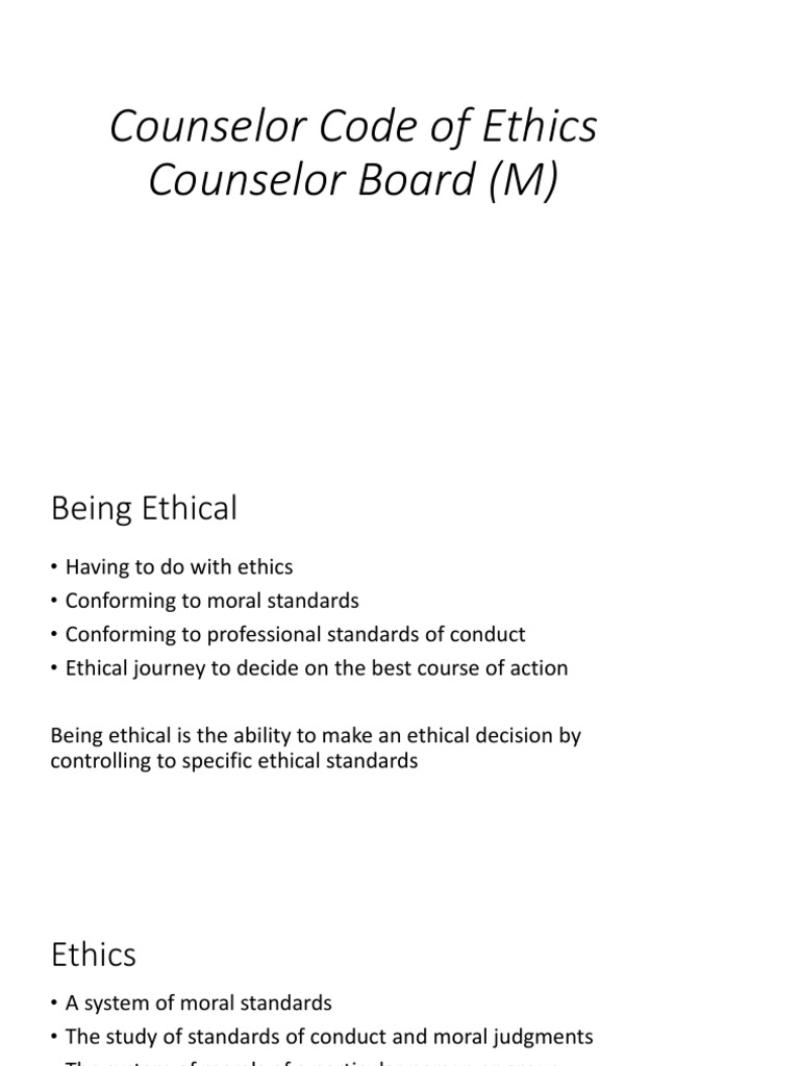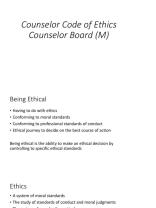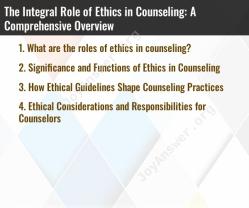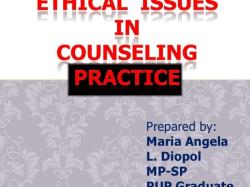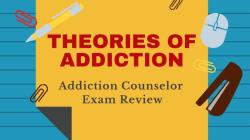What is counseling ethics?
Counseling ethics refers to the principles, standards, and guidelines that govern the ethical conduct of counselors in their professional practice. These ethical tenets provide a framework for responsible and moral behavior, guiding counselors in their interactions with clients, colleagues, and the broader community. The aim of counseling ethics is to ensure the well-being of clients, protect their rights, and maintain the integrity of the counseling profession.
Key tenets of counseling ethics include:
Confidentiality:
- Counselors are ethically obligated to protect the confidentiality of information shared by clients during counseling sessions. Exceptions to confidentiality are limited and typically involve situations where there is a risk of harm to the client or others.
Informed Consent:
- Obtaining informed consent is a fundamental ethical requirement. Counselors must provide clients with information about the nature and purpose of counseling, the counselor's approach, potential risks and benefits, and the limits of confidentiality.
Competence:
- Counselors are expected to maintain a high level of professional competence. This involves ongoing education, training, and self-assessment to ensure that counselors are capable of providing effective and ethical services.
Non-Discrimination and Cultural Competence:
- Counselors must avoid discrimination and be culturally competent. This involves recognizing and respecting the diversity of clients, including their cultural backgrounds, identities, and experiences.
Boundaries:
- Maintaining appropriate professional boundaries is crucial. Counselors should avoid dual relationships that could compromise objectivity or harm the therapeutic relationship. Clear and ethical boundaries contribute to a safe and effective counseling environment.
Avoiding Harm:
- Counselors are obligated to avoid causing harm to clients. This involves selecting interventions carefully, monitoring for potential adverse effects, and ensuring that counseling practices are designed to benefit clients.
Respecting Autonomy:
- Clients have the right to autonomy and self-determination. Counselors should respect the client's right to make decisions about their own lives, even when those decisions may differ from the counselor's personal values.
Professional Integrity:
- Professional integrity involves honesty, transparency, and maintaining the trust of clients. Counselors should provide accurate information, avoid conflicts of interest, and uphold the values of the counseling profession.
Supervision and Consultation:
- Counselors in training and practicing counselors are encouraged to seek supervision and consultation. Supervision provides a space for reflection, guidance, and feedback to support ethical practice and ongoing professional development.
Advocacy and Social Justice:
- Counselors are encouraged to advocate for the rights and well-being of their clients and to address systemic issues contributing to clients' challenges. Ethical counseling involves promoting social justice and equality.
These tenets are often articulated in the codes of ethics established by professional counseling organizations, such as the American Counseling Association (ACA) or the National Board for Certified Counselors (NBCC). Counselors are expected to familiarize themselves with the specific code of ethics relevant to their profession and adhere to its principles in their daily practice.
Ethical considerations are dynamic, and counselors may encounter complex dilemmas that require thoughtful decision-making. Regular training, supervision, and ongoing education are essential for counselors to navigate ethical challenges and provide high-quality and ethically sound counseling services.
Understanding the Foundations of Counseling Ethics
Counseling ethics are at the heart of the profession, ensuring responsible and client-centered practice. To understand them well, let's dive into their foundations:
1. Core Values:
- Respect for Personhood: Honoring the inherent dignity and worth of every individual, regardless of their background or challenges.
- Autonomy and Self-Determination: Empowering clients to make their own choices about their lives and respecting their right to refuse services.
- Beneficence and Non-Maleficence: Striving to promote client well-being and actively avoiding any harm, including physical, emotional, or psychological.
- Justice and Fairness: Advocating for equal access to mental health services and challenging discrimination in all its forms.
- Integrity and Honesty: Upholding high ethical standards and being truthful in interactions with clients, colleagues, and the public.
2. Ethical Principles:
These principles translate the core values into actionable guidelines for conduct:
- Confidentiality: Protecting client information and respecting privacy, with exceptions only in cases of imminent danger or legal requirements.
- Informed Consent: Ensuring clients understand the nature and purpose of counseling, potential risks and benefits, and alternative options before agreeing to participate.
- Professional Boundaries: Maintaining appropriate professional relationships with clients, avoiding dual relationships, and refraining from any exploitative or manipulative behavior.
- Competence and Cultural Awareness: Practicing within the boundaries of one's skills and knowledge and demonstrating sensitivity to clients' cultural backgrounds and values.
- Social Justice Advocacy: Using professional skills to raise awareness of systemic inequalities and advocating for change that benefits marginalized communities.
3. Ethical Codes and Standards:
Professional organizations like the American Counseling Association (ACA) and the American Psychological Association (APA) have established ethical codes that provide detailed guidelines on specific scenarios and decision-making processes. These codes are crucial for upholding professional standards and ensuring ethical practice across diverse counseling settings.
Ethical Standards and Guidelines in the Counseling Profession
Ethical standards and guidelines have a tangible impact on how counselors operate:
- Guiding Clinical Decision-Making: When faced with complex situations, ethical principles act as a compass, helping counselors make responsible and client-centered choices.
- Establishing Professional Boundaries: Ethical codes define appropriate boundaries between counselor and client, minimizing the risk of harm and maintaining a safe therapeutic environment.
- Promoting Cultural Competence: Guidelines encourage counselors to acknowledge and respect cultural diversity, adapt their approach to individual needs, and avoid imposing personal biases.
- Ensuring Informed Consent: Ethical standards outline requirements for obtaining informed consent, allowing clients to make knowledgeable decisions about their counseling journey.
- Addressing Ethical Dilemmas: Codes provide frameworks for navigating complex ethical situations, encouraging consultation with colleagues or supervisors when needed.
Application of Ethics in Counseling Practices and Decision-making
Let's see how ethics translate into everyday practice:
- Case 1: Confidentiality and Mandatory Reporting: A client discloses abuse they suffered as a child. While respecting confidentiality, the counselor might have to report the abuse to protect the individual and comply with mandatory reporting laws.
- Case 2: Cultural Competence and Communication: A counselor working with a non-English speaking client ensures communication barriers are minimized by utilizing interpreters, translating materials, and actively listening to non-verbal cues.
- Case 3: Boundary Violations and Self-Awareness: A counselor recognizes developing feelings for a client and immediately seeks consultation with a supervisor to discuss appropriate steps, including potential referral to another therapist.
Remember, ethical practice is not just about following rules; it's about internalizing core values, continuously reflecting on one's actions, and actively seeking guidance when faced with uncertainty. By upholding ethical principles, counselors can create a safe and supportive environment for clients, build trust, and contribute to a more just and equitable society.
Feel free to ask further questions about specific ethical considerations, dilemmas, or situations you'd like to explore in more detail. I'm here to help you understand and navigate the intricate world of counseling ethics!
